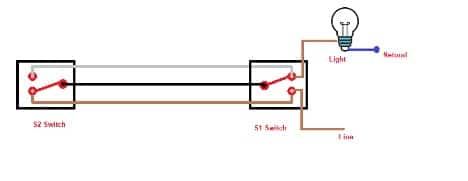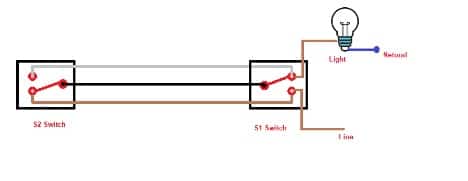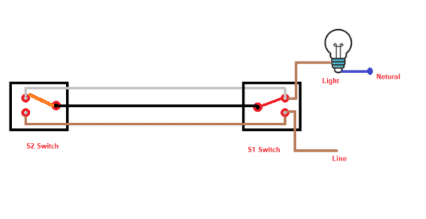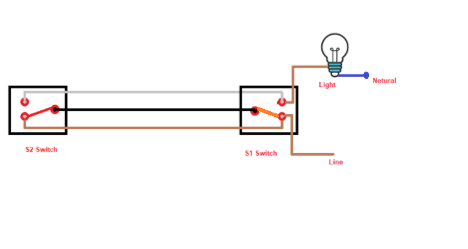The 2-way switch acts as 2 switches that can control a single appliance. This is a 2-switch for a single appliance. You might ask a question here why do we want or need 2 switches for a single appliance when we have one?
The two-way switches are generally used for staircase lightning and other lightning systems where we want to take control of appliances from two different locations.
Suppose you are on the top of stairs and want to turn on the light above the stairs, then using the 2 way switch you can turn on/off the same light with two different areas or locations. Here you can turn on the stairs light either from the top of the stairs or from the bottom stairs using the two-way switch.
You can use the two-way switch either on the stairs, garage, or in the garden where you can switch the garden light either while in the garden or when inside the hall, or in the home.

As you can see in the pic below, we can observe a common wiring setup involving two switches. The middle wire represents the common pin of both switches, while the Line L1 and L2 pins on each switch carry the live current from the power source.
When the plunger of the first switch moves downward, it establishes a connection with the line wire. Simultaneously, the plunger of the second switch is in an upward position, making contact with the live wire of the bulb. This configuration creates a closed circuit, allowing the bulb to illuminate.
Conversely, if we move the plunger of the switch upward, it interrupts the connection. Even if the plunger of the first switch remains in the upward position, the light connection becomes open, resulting in the bulb turning off.
Now, let’s consider the second scenario. If the plunger of the second switch moves upward, it connects with the live wire of the light bulb. Meanwhile, the plunger of the first switch remains in the downward position, touching the live wire. As a result, the bulb receives power and lights up. However, if the plunger of the second switch moves downward, it disconnects from the live wire of the bulb, causing an open circuit and subsequently turning off the light.
In this manner, the two-way switch enables the control of the bulb’s power state from different locations. Regardless of their physical separation, the coordinated movement of both switches allows for convenient on/off operation of the light bulb.



Difference between 2-Way Switch And One-way Switch
The Two-way switch costs more and the material and components and wiring required are more than one way switch. The Two-way switch has the advantage that you can control the appliance from two different locations. The two-way switch uses 2 switches while one-way switch uses 1 switch and simple wiring while the wiring of 2-way switch is complex.
The main difference between a two-way switch is unlike the one-way switch; it can mark as on or off while the 2-way switch depends on and off of switches that are present in other locations.
One-way switch is used in small area and room while two-way switches are used in stairs, hall,s or larger areas.
To read other interesting Electronics Basics articles: click here






